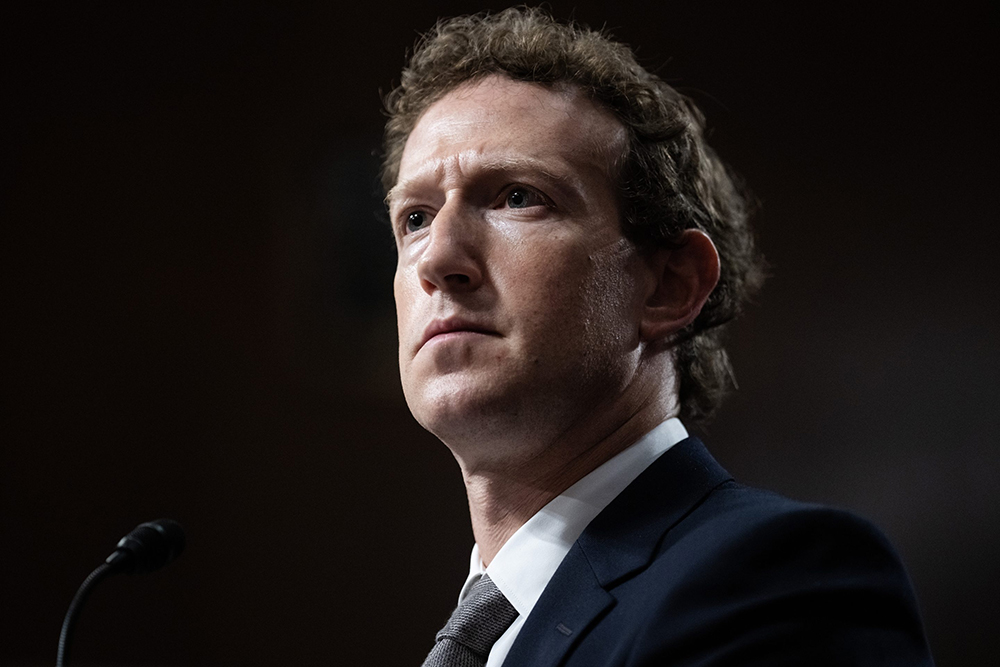
做好迎接动荡的准备,并保持耐心。这是马克·扎克伯格周三向Meta股东们传达的信息。他解释了在人工智能领域投资数百亿美元的决策。在人工智能领域的大规模投资需要持续多年,才能看到任何有意义的回报。
作为Meta的联合创始人和CEO,扎克伯格表示,他最近对于公司在竞争激烈的生成式人工智能服务市场占据主导地位的前景变得更加乐观,而且他总结说“投资人工智能是明智的决策”。Meta旗下包括Instagram、Facebook和WhatsApp等应用。
扎克伯格在公司第一季度业绩电话会议上表示,这可能会令投资者不满。在他结束演讲几个小时后,Meta股价下跌超过15%。 “历史上,在公司投资和推广尚未开始盈利的新产品阶段,公司股价经常会出现波动。”
Meta在周三表示,今年,推动人工智能宏大目标的资本支出总计达到400亿美元,比其在去年10月确定的规模多了50亿美元。而且该公司表示,未来几年还会持续增加投入。扎克伯格说道:“这个过程可能需要几年时间。”
但他也指出,“明智的投资者”会抓住机会,保持耐心。毕竟,他表示,公司以前曾经经历过这样的阶段,例如对Reels和Stories等产品的投资,后来都带来了回报。
直接请求华尔街保持耐心,这凸显出Meta加入人工智能军备竞赛所面临的风险。据媒体报道,微软(Microsoft)计划投入高达1,000亿美元,与ChatGPT的开发者OpenAI合作建设一个专用人工智能数据中心。谷歌(Google)的母公司Alphabet多年来一直在大力投资人工智能。
谷歌和微软都可以通过自有的云服务业务将对人工智能的投资实现盈利,但Meta却没有云服务业务。不过,扎克伯格表示,除了传统广告业务外,“计算”收费将是利用人工智能技术产生收入的一种方式。
扎克伯格称他之所以对Meta在人工智能领域的前景越来越有信心,是因为公司最近发布的大语言模型Llama 3,以及在几个国家推出的该技术的消费者版本Meta AI。扎克伯格表示,有数千万人已经使用过Meta AI,公司计划未来几个月面向更多用户推出该产品。
目前,用户与Meta AI互动不会产生任何直接收入,但扎克伯格反复提到公司以往在产品达到足够规模后实现盈利的成绩,只是他并没有预测实现盈利的时间。
“我们现在要证明公司有能力开发领先的模型,因此我认为投资人工智能是合理的决策。我们会坚持投资。而且我认为这将是一笔很好的长期投资。”(财富中文网)
翻译:刘进龙
审校:汪皓
Meta CEO马克·扎克伯格。TOM WILLIAMS/CQ-ROLL CALL, INC VIA GETTY IMAGES
做好迎接动荡的准备,并保持耐心。这是马克·扎克伯格周三向Meta股东们传达的信息。他解释了在人工智能领域投资数百亿美元的决策。在人工智能领域的大规模投资需要持续多年,才能看到任何有意义的回报。
作为Meta的联合创始人和CEO,扎克伯格表示,他最近对于公司在竞争激烈的生成式人工智能服务市场占据主导地位的前景变得更加乐观,而且他总结说“投资人工智能是明智的决策”。Meta旗下包括Instagram、Facebook和WhatsApp等应用。
扎克伯格在公司第一季度业绩电话会议上表示,这可能会令投资者不满。在他结束演讲几个小时后,Meta股价下跌超过15%。 “历史上,在公司投资和推广尚未开始盈利的新产品阶段,公司股价经常会出现波动。”
Meta在周三表示,今年,推动人工智能宏大目标的资本支出总计达到400亿美元,比其在去年10月确定的规模多了50亿美元。而且该公司表示,未来几年还会持续增加投入。扎克伯格说道:“这个过程可能需要几年时间。”
但他也指出,“明智的投资者”会抓住机会,保持耐心。毕竟,他表示,公司以前曾经经历过这样的阶段,例如对Reels和Stories等产品的投资,后来都带来了回报。
直接请求华尔街保持耐心,这凸显出Meta加入人工智能军备竞赛所面临的风险。据媒体报道,微软(Microsoft)计划投入高达1,000亿美元,与ChatGPT的开发者OpenAI合作建设一个专用人工智能数据中心。谷歌(Google)的母公司Alphabet多年来一直在大力投资人工智能。
谷歌和微软都可以通过自有的云服务业务将对人工智能的投资实现盈利,但Meta却没有云服务业务。不过,扎克伯格表示,除了传统广告业务外,“计算”收费将是利用人工智能技术产生收入的一种方式。
扎克伯格称他之所以对Meta在人工智能领域的前景越来越有信心,是因为公司最近发布的大语言模型Llama 3,以及在几个国家推出的该技术的消费者版本Meta AI。扎克伯格表示,有数千万人已经使用过Meta AI,公司计划未来几个月面向更多用户推出该产品。
目前,用户与Meta AI互动不会产生任何直接收入,但扎克伯格反复提到公司以往在产品达到足够规模后实现盈利的成绩,只是他并没有预测实现盈利的时间。
“我们现在要证明公司有能力开发领先的模型,因此我认为投资人工智能是合理的决策。我们会坚持投资。而且我认为这将是一笔很好的长期投资。”(财富中文网)
翻译:刘进龙
审校:汪皓
Brace for turbulence, and have patience. That was Mark Zuckerberg’s message to Meta shareholders on Wednesday as he explained his decision to plow tens of billions of dollars into a multi-year AI spending spree that will precede any meaningful payoff.
The cofounder and CEO of Meta, which owns Instagram, Facebook, and WhatsApp, said that he’d recently become more optimistic about the company’s prospects to dominate the highly competitive market for generative AI services, and that he’d concluded that “it makes sense to go for it.”
That may not sit well with investors, Zuckerberg acknowledged during the company’s first quarter earnings call —and shares of Meta were down by more than 15% after hours as he spoke. “We’ve historically seen a lot of volatility in our stock during this phase of our product playbook where we’re investing and scaling a new product but aren’t yet monetizing it.”
Meta said Wednesday that the capital expenditures to power its AI ambitions could total $40 billion this year, up to $5 billion more than it had earmarked in October. And costs will only go up in the years to come, the company said. “This is likely going to take several years,” he said.
But Zuckerberg also made a point to note that “smart investors” will recognize the opportunity at hand and be patient. After all, the company has been through this before, he said, pointing to investments in products like Reels and Stories that have since paid off.
The direct appeal to Wall Street for patience underscores the risk of the AI arms race that Meta is committing itself to. Microsoft reportedly plans to spend up to $100 billion to build a specialized AI datacenter with ChatGPT-maker OpenAI. And Google-owner Alphabet has been investing heavily in AI for years.
While Google and Microsoft both have cloud businesses that serve as vehicles to monetize their AI investments, Meta is not in the cloud business. But Zuckerberg hinted that charging for “compute” could be one avenue for generating revenue from its AI technology, along with its traditional advertising business.
Zuckerberg ascribed his increasing confidence in Meta’s AI prospects to the company’s recently released Llama 3 large language model, and the technology’s consumer version of it, dubbed Meta AI in a few countries. Tens of millions of people have already tried Meta AI, Zuckerberg said, and the company is planning to roll it out to more users in the coming months.
Meta doesn’t generate any direct revenue when users interact with Meta AI right now, but Zuckerberg repeatedly pointed to the company’s track record of monetizing its products when they reach sufficient scale—he just didn’t say when that moment would be.
“What we’ve shown now is we have the ability to build leading models in our company so I think it makes sense to go for it. And we’re going to. And I think it’s going to be a good long term investment.”






